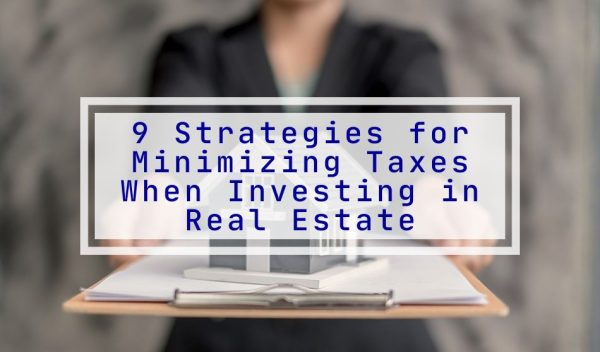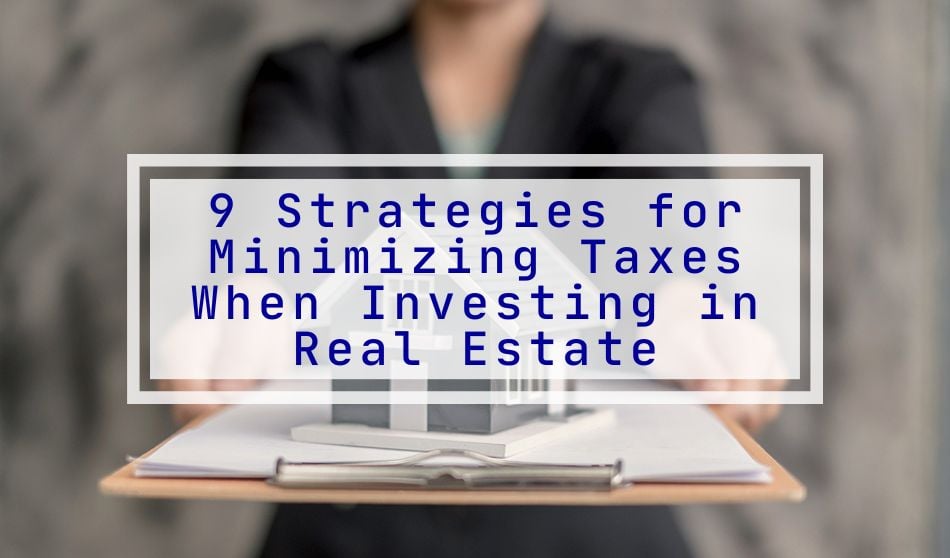
Investing in real estate has long been an effective way to build wealth.
Part of the secret to building wealth by investing in real estate? Tax reductions.
Compared to normal income, money earned through real estate investment carries less significant tax penalties. Savvy real estate investors know what actions to take to minimize their tax burden and pocket more money.
Learn about 9 strategies that can help real estate investors like you minimize taxes and run a more successful business.
1. Hold Properties for More Than One Year
As a real estate investor, step one to saving money on taxes is holding properties for more than one year.
If you own an investment such as real estate property for less than one year and sell it for a profit, the profit is taxed at your normal income tax rate. If you own an investment for more than one year before selling, you can likely sell it at a capital gains tax rate – which at 15%, may be around half your normal rate. Plus, if you hold a property for more than a year, you can make more money by leasing the property and selling it after the value of the home has appreciated.
2. Own Properties in a Self-Directed IRA
If you’ve worked a W2 job, you’re likely acquainted with tax-advantaged retirement savings. 401(k) plans, individual retirement accounts (IRAs), Roth IRAs – everyone has a different strategy.
As a real estate investor seeking a tax break, you should be aware of the self-directed IRA. Self-directed IRAs are IRAs held by a custodian that allows investment into different assets, such as properties.
You will likely need to hire a custodian or trust company to administer your self-directed IRA and create an LLC or other legal entity to buy and own investment properties. This way, you can invest money into your LLC and then into your properties – all tax-free.
3. Take Advantage of a 1031 Exchange
What if you could sell a property for a profit and pay no taxes on your earnings?
It’s possible with a Section 1031 exchange. Otherwise known as a “like-kind exchange,” the 1031 exchange allows you to reinvest profits from a real estate investment into another real estate investment. In comparison, if you choose to classify your profits as income, you’ll pay income or capital gains taxes.
Best of all, you can reinvest with 1031 exchanges every time you sell one property and buy another – building wealth while avoiding or minimizing taxes on your investments.
Learn more: Tax Deferred 1031 Exchange Basics for Investors
4. Maximize Your Deductions
In real estate investing, minimizing taxes means maximizing your deductions.
Just about every real estate expense is deductible, including:
- Mortgage interest
- Maintenance costs
- Insurance
- Property taxes
- Legal fees
- Property management fees
- Advertising expenses
- Home office expenses
- Closing costs
- Travel and mileage
- Real estate software or tools
Fortunately, deductions aren’t available only to major real estate investors. If your itemized deductions won’t be substantial, you can always elect for a standard deduction.
5. Use the 20% Pass-Through Deduction
In recent years, real estate investors have gained access to another tax minimization strategy: the 20% pass-through deduction.
Included in the Tax Cuts and Jobs Act of 2017 (TCJA), the pass-through deductions allow some small business owners to deduct an extra 20% of their net business income, meaning that you may be able to deduct a full 20% of your real estate business income from your taxable income.
Another provision you should be aware of in the TCJA is Opportunity Zones, designated business-starved areas that may allow you to invest in property for a reduced tax burden.
6. Borrow, Don’t Sell, to Realize Appreciation
Say you buy a property and hold onto it for five years. Assuming you’re on top of maintenance and upkeep, you’ll have built equity in an asset that’s worth more than it was five years ago. Selling to realize that appreciation may be tempting, but savvy real estate investors minimize their tax burden by borrowing against appreciating properties.
You can borrow against the property and deduct those borrowing costs from your taxes. Your tenants can pay off your loan and your property keeps appreciating – boosting your wealth and access to capital.
7. Hold an Installment Sale
Selling a property doesn’t have to mean cashing out and paying taxes all at once. Instead, consider selling in installments to reduce your tax burden.
With an installment sale, a buyer pays for your property in installments across multiple tax years. This way, you can classify your profits as long-term, instead of short-term, capital gains. Long-term capital gains are taxed at a lower rate, so installment sales save you money over time.
8. Don’t Pay Double FICA Taxes
FICA taxes are employment taxes that fund Social Security and Medicare. Employers pay 7.65%, employees pay 7.65%, and if you’re self-employed, you’ll pay a full 15.3% of your real estate investment income.
This can be avoided. As a real estate investor, you don’t want the IRS to classify you as a dealer, or someone who owns a property with the primary intent of selling it.
Instead, avoid dealer status and double FICA taxes by demonstrating investment intent. Show that you’re selling properties to generate capital for other investment practices, such as a down payment or improvement costs. With the help of an accountant, you can also consider starting a legal entity such as a partnership LLC or S-corp that comes with different tax expectations.
9. Depreciate Properties
Appreciation may be a goal of real estate investors, but it comes with expenses, as your property taxes rise if your property is valued higher.
You can blunt the tax drawbacks of appreciation by depreciating your property. Every year, you can deduct a fraction of your property’s building value. Capital improvements can also be depreciated, saving you money – at least until you sell the property and pay for depreciation recapture.






